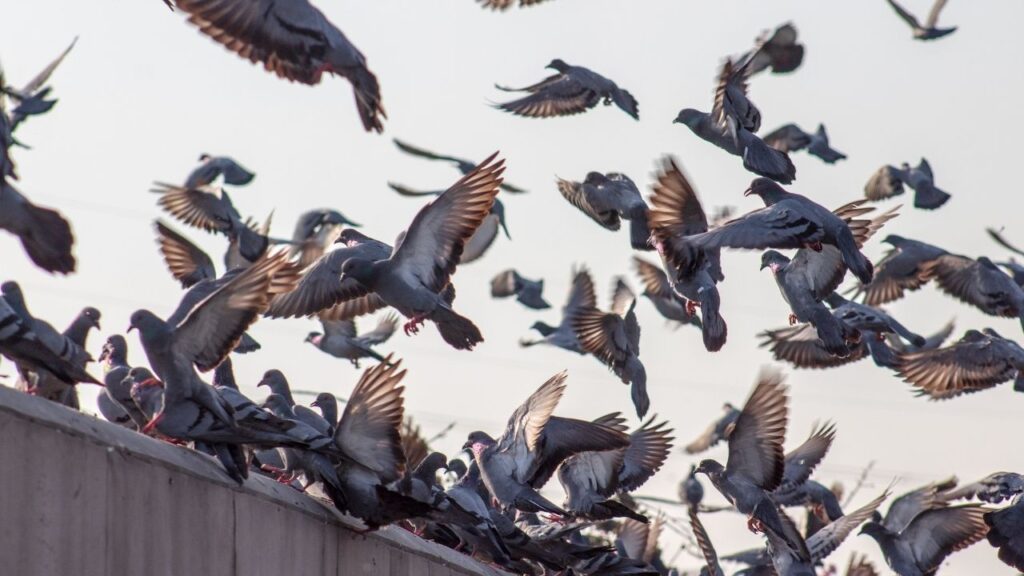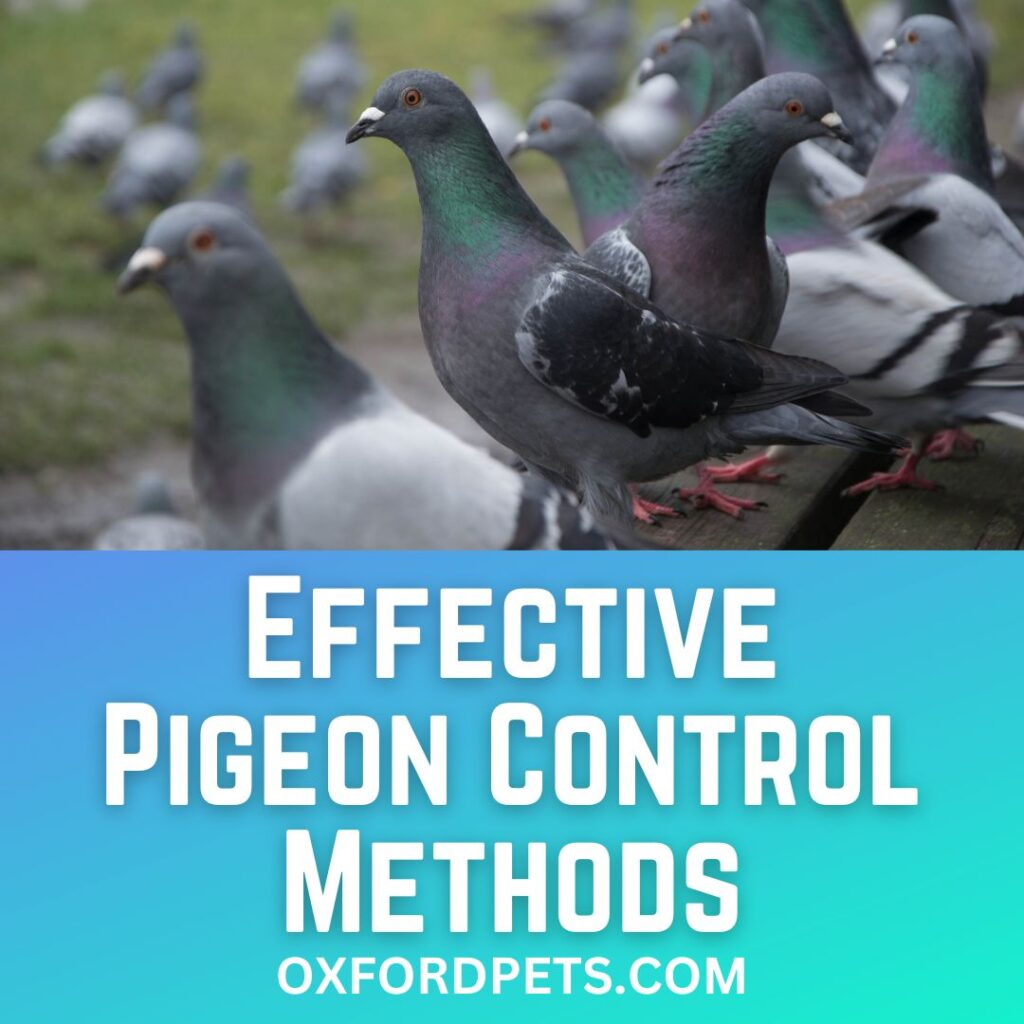Have you ever woken up to the relentless cooing of pigeons or found your balcony decorated with unwelcome droppings? Maybe you’ve spent a Sunday scrubbing away at stains that just won’t budge, courtesy of our feathered “friends.”
Dealing with pigeons/doves isn’t just about aesthetics or a disrupted morning routine; it’s a battle to protect your space, health, and peace of mind. These birds, as innocuous as they seem, can cause significant damage and health concerns, from eroding building materials to potential disease risks.
But where do you start when it comes to pigeon control? How do you reclaim your home without resorting to harsh methods?
3 Main Preventive Measures
The first line of defense in pigeon control is prevention. It’s about making your home less appealing to these birds, so they decide to perch elsewhere. This doesn’t require any drastic measures; often, small changes in your daily routine can make a big difference.
1. Keeping the Area Clean
You might not realize it, but those few crumbs you left on the patio or the seeds that fell from your bird feeder are like a dinner bell for pigeons. They’re not picky eaters, and even the smallest food scraps can attract them.
Start by making sure outdoor eating areas are crumb-free and regularly clean up any food residues.
2. Proper Garbage Management
Your garbage might not be gourmet to you, but to a pigeon, it’s a treasure trove. Consider using bins with locking lids or placing them in a secured area. Remember, if pigeons can’t find anything to snack on, they’re less likely to stick around.
3. Landscaping as a Deterrent
Who knew your garden could be an ally in pigeon control? Plants like peppermint and lavender are known to repel pigeons due to their smell. You can plant these plants in your garden or in pots and place them in your balcony to put off pigeons.
4. Block Entry Points
Identify and seal off any openings or gaps where pigeons can nest, such as vents, eaves, or broken windows. Blocking these entry points will prevent pigeons from establishing nests on your property.

5 Key Reasons for Effective Pigeon Management in Residential Settings
Maintaining proper control of pigeons in residential areas is essential for safeguarding pets, preserving hygiene, and protecting property integrity. Pigeons are known carriers of harmful diseases and parasites that could adversely affect pets.
Their acidic droppings not only pose health hazards but also lead to property damage. Understanding why managing pigeon populations is crucial includes acknowledging several key factors:
- Disease Mitigation: Diseases such as psittacosis, cryptococcosis, and histoplasmosis can be transmitted by pigeons to both pets and humans.
- Parasite Management: Hosting pests like fleas, ticks, and mites, pigeons can infest pets, leading to discomfort and health complications.
- Minimizing Damage and Mess: The acidic nature of pigeon droppings can erode structures, vehicles, and outdoor furniture. Effective control measures are necessary to avert this damage.
- Alleviating Disturbance: Pigeons can create noise pollution and disrupt the tranquility of home environments, causing stress for both pets and their owners.
- Preventing Food Contamination: Pigeons may also contaminate pet food or water sources, especially if they have access to feeding areas.
Deterrent Measures
If pigeons have already invaded your space, it’s time to move beyond prevention into deterrent methods. Here are some effective pigeon control strategies that homeowners swear by:
1. Physical Barriers:
Bird Netting
Bird netting is a lightweight, durable net made used to create a physical barrier for birds You can install this netting over areas where pigeons commonly roost or nest, such as balconies, air conditioning units, ledges, or open beams.
Proper installation is key to ensuring the effectiveness of bird netting. Here’s how to use it:
- First, pinpoint where pigeons are roosting or likely to roost.
- Measure the area to cover, ensuring you leave no gaps or loose ends.
- Use anchors and ties to secure the netting to the surrounding structure. The net should be taut and firm.
- Occasionally check the netting for any damage or gaps that might need fixing.
Bird Spikes
Bird spikes consist of long, needle-like rods attached to a base that can be easily fixed onto various surfaces to create an uncomfortable landing surface. They can be used on ledges, roof-lines, window sills, and any flat surface where pigeons are known to roost.
Bird Slopes
Bird slope panels are an innovative and effective way to deter pigeons from settling on your property. These panels are shaped into an angled, slippery surface that is typically installed on roofs, ledges, eaves, beams, and other similar architectural features where pigeons tend to perch. The steep, slippery slope makes it difficult for pigeons to land and balance, effectively deterring them from staying.
2. Visual Deterrents:
- Predator Decoys: Placing decoys of natural predators, such as owls or hawks, can create the illusion of danger for pigeons and deter them.
- Reflective Surfaces and Objects: Pigeons, like many birds are sensitive to bright, moving lights. Reflective materials such as mirrors, old CDs, reflective tape, or even metallic objects can be used to create unpredictable patterns of light when moved by the wind. These reflections often confuse and scare pigeons, preventing them from landing or nesting in the area.
3. Sound Deterrents:
- Ultrasonic Devices: Use ultrasonic devices that emit sounds at frequencies irritating to pigeons but are generally inaudible to humans.
- Bird Distress Calls: Play recorded distress calls of pigeons or predator birds to discourage them from the area.
4. Chemical Repellents
Chemical repellents are designed to create an unwelcoming environment for pigeons without causing them harm, encouraging them to seek out other areas.These repellents contain substances that pigeons find unpleasant, either by scent or taste and come in various forms, such as sprays, gels, or granules. Some chemical repellents also mimic predator scents, which can effectively scare pigeons away.
- Avian Repellent Gels: Apply non-toxic avian repellent gels on surfaces to create an uncomfortable landing area for pigeons.
- Sprays: Use bird repellent sprays that are safe for the environment to deter pigeons from specific areas.
Tips for using chemical repellents:
- Apply the repellent in areas where pigeons roost, nest, or feed.
- Use as directed to ensure effectiveness and safety.
- Some chemical repellents may need reapplication over time, especially after rain or in areas with high pigeon traffic.
5. Feeding Control:
-
- Limit Food Sources: Pigeons are attracted to food scraps. Ensure that garbage bins are tightly sealed, and food spills are promptly cleaned to reduce the available food sources.
- Anti-Pigeon Feeders: Use feeders designed to prevent pigeons from accessing food while allowing smaller birds to feed.
Pigeon Removal Methods
When preventive measures and deterrents aren’t enough, it may be necessary to consider more direct methods of pigeon removal. These include:
Habitat Modification:
-
- Remove Nesting Sites: Eliminate potential nesting sites, such as removing debris and sealing off openings in buildings where pigeons may nest.
- Trim Trees and Bushes: Keep trees and bushes trimmed to reduce roosting opportunities.
Professional Pest Control:
-
- Pest Control Services: Consult with professional pest control services that specialize in bird control. They can provide a customized plan based on the specific pigeon problem.
Legal Considerations:
-
- Check Local Regulations: Before implementing control measures, be aware of local regulations regarding the treatment of pigeons. In some places, certain control methods may be restricted.
Summary
In conclusion, effective pigeon control is essential for homeowners looking to protect their property, health, and well-being. To manage pigeon problems, start with preventative measures: keep areas clean, manage garbage properly, and use landscaping as a deterrent. If pigeons persist, employ deterrent methods like bird netting, spikes, slopes, reflective surfaces, and chemical repellents.
Each of these methods should be used responsibly and ethically, considering the well-being of the birds. For more severe infestations, methods like removing nesting materials, humane trapping and relocation, or consulting a professional pigeon control service may be necessary. By combining these strategies, homeowners can effectively reclaim their space from pigeons, ensuring a peaceful and clean environment.




